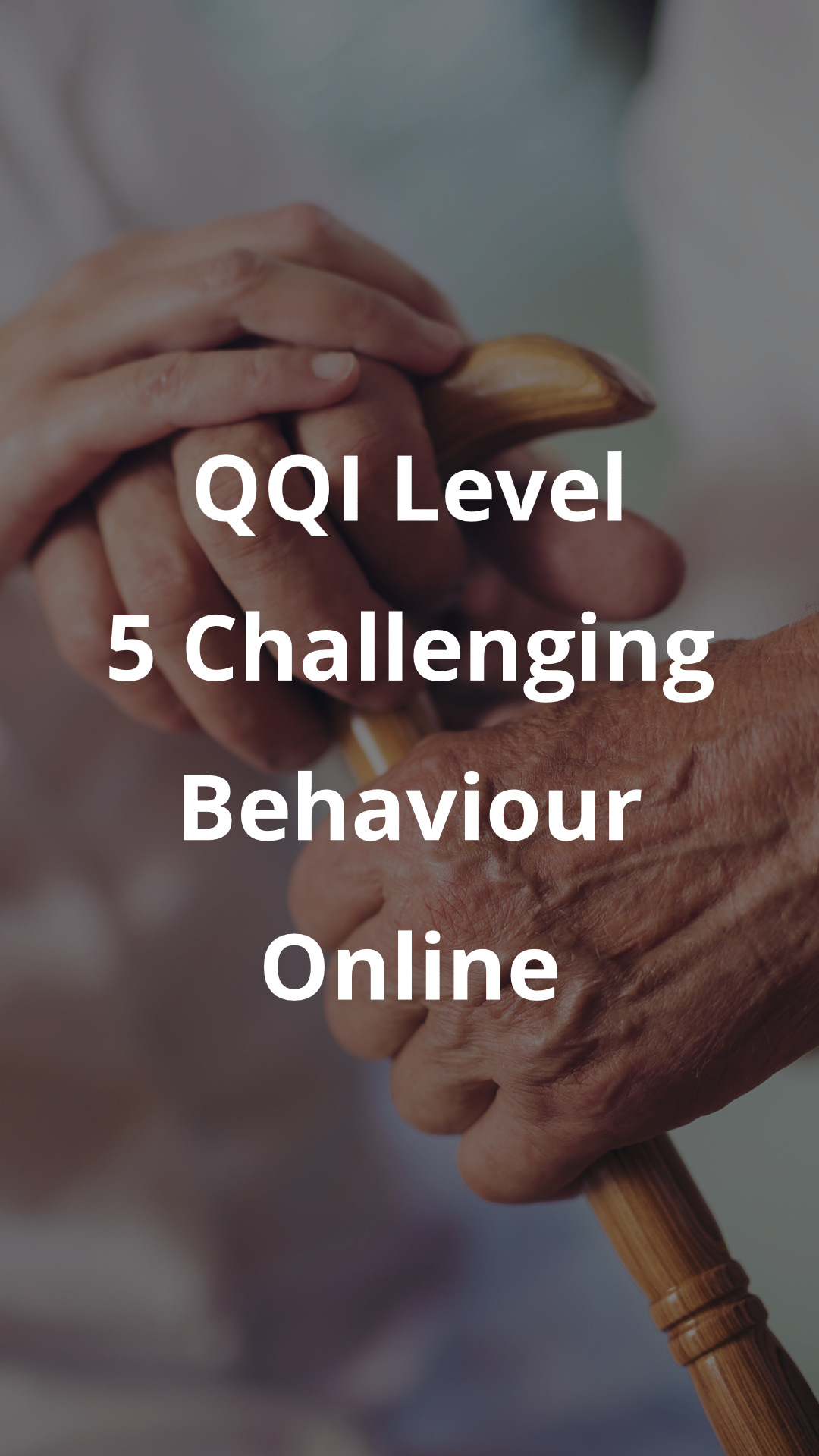
QQI Level 5 Challenging Behaviour Course Online
Our level 5 challenging behaviour course is a QQI accredited blended learning course. Once enrolled you will be assigned a tutor whom you can contact through email & phone. During your course, you will be required to attend a one day workshop. The purpose of this course is to equip you with the relevant knowledge, skills and competence in supporting individuals with intellectual disability with challenging behaviour.
QQI Level 5 Challenging Behaviour Course Online
Our level 5 challenging behaviour course is a QQI accredited blended learning course. Once enrolled you will be assigned a tutor whom you can contact through email & phone. During your course, you will be required to attend a one day workshop. The purpose of this course is to equip you with the relevant knowledge, skills and competence in supporting individuals with intellectual disability with challenging behaviour.

Course syllabus:
- Define the concept of “challenging behaviour”
- Identify inappropriate behaviour presented by an individual with intellectual disability
- Describe behaviour in observable, measurable terms
- List the goals of Positive Behaviour Support
- Explain how internal factors, related to a person’s health and well being, can underlie challenging behaviour
- Explain how external factors related to the environment and the reactions to behaviour, can underlie challenging behaviour
- Define the terms “positive reinforcement”, “negative reinforcement”, “antecedent” and “setting events”
- Recognise examples of positive and negative reinforcement of inappropriate or challenging behaviour in daily situations in the lives of people with intellectual disability
- Recognise examples in the daily lives of people with intellectual disability, where inappropriate or challenging behaviour is being maintained by the setting events and antecedents prior to the behaviour
- Demonstrate how the parts of the Antecedent, Behaviour Consequence (ABC) model work together
- Use an ABC chart for recording observations of inappropriate or challenging behaviour
- Gather and record information about an individual with intellectual disability that can be used in the analysis of challenging behaviour and development of a support plan
- Distinguish between inappropriate behaviour and challenging behaviour
- Describe the challenging behaviour presented by an individual with intellectual disability in terms that are observable and measurable
- Outline the typical strategies used by staff and carers for dealing with inappropriate behaviour
- Outline the values underpinning Positive Behaviour Support
- Evaluate how well the goals and values of the Positive Behaviour Support model fit in with the policies of a service provider relating to challenging behaviour
- Discuss how challenging behaviour can be reinforced both positively and negatively
- Explain why negative reinforcement and punishment are not used in the Positive Behaviour Support model
- Describe the four types of strategies that constitute Positive Behaviour Support:
- teach new skills
- teach alternative skills to replace the challenging behaviour
- change the environment
- use the ABC model to increase desirable behaviour and decrease or prevent challenging behaviour
- Outline the guidelines for selecting skills to teach
- Discuss a range of characteristics that promote positive environments
How blended learning works
Course profile
Entry requirements
No particular skills, knowledge or competence will be required of you for successful completion of this course, however you will be expected to have a minimum of Level 4 Certificate standard of education or equivalent together with a strong interest in the provision of quality care. It is essential that you have competence in written and spoken English, along with computer literacy skills.
Who should enrol?
The level 5 challenging behaviour course will cater for a variety of adult learners ranging from school leavers with no previous experience in the healthcare sector to more mature adults with relevant life or work experience. Some of the latter will have previously had some education and training in healthcare. More mature adults will frequently be seeking new career opportunities, be working in the home or currently working in the healthcare sector. These will tend to opt for the part-time learning route to achieving the award.
Further details:
- Qualification gained: Challenging Behaviour QQI Award (Minor) Level 5 – 5N1706
- Assessment method: Continuous assessment including assignments, projects, skills demonstrations and learner records: Assignment’s 40% (2 assignments) & Project 60%
- Work experience: No formal work experience is required for this course.
- Exemptions: Recognition of prior learning can only by sought if the learner is working towards a major award.
- Career opportunities: Healthcare Assistant, Carer, Care Worker; Progression to further education.
- Progression to further learning:
- This course leads to a level 5 minor award on the National Framework of Qualifications.
- You can progress to our QQI Level 5 Healthcare Full Major Award.
Protection for learners
In compliance with Qualifications and Quality Assurance (Education and Training) Act 2012 Part 6, where Chevron College offers training programmes of 3 months duration or more, Learner Protection cover is in place via relevant financial product, should Chevron College cease to provide QQI programmes before learners have completed awards.



